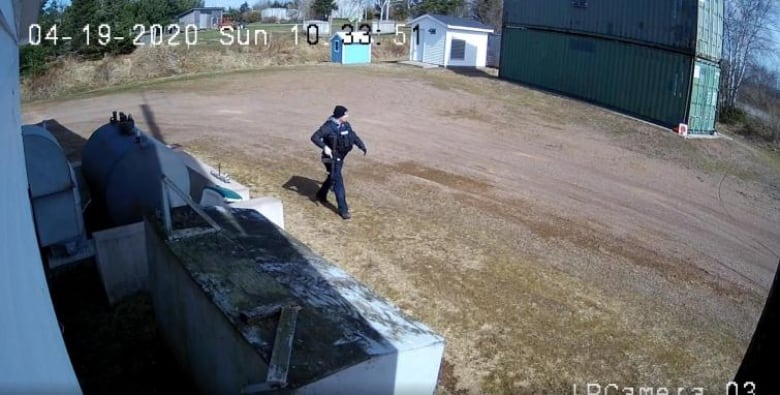Nova Scotia firefighters still dealing with the trauma of having RCMP officers fire shots at their hall two years ago say they are “shocked” to see new internal documents from the Mounties echoing their own concerns about the incident.
During the April 2020 mass shooting across the province, two RCMP officers fired five rounds that hit the Onslow Belmont Fire Brigade hall in Colchester County while searching for the gunman. They mistook a municipal official in a safety vest standing beside an RCMP cruiser for their suspect, who they knew was driving a mock police car.
The Mass Casualty Commission leading the inquiry into a gunman’s rampage that killed 22 people has continued releasing documents in recent weeks, even after public hearings ended.
Included is an internal January 2021 memo from the Nova Scotia RCMP’s Hazardous Occurrence Investigation Team (HOIT) which says a report on the Onslow shooting, commissioned by the province’s police watchdog, had multiple “inaccuracies and omissions.”
Onslow firefighters Darrell Currie and Greg Muise, who were inside the hall during the shooting, have long criticized that report from Nova Scotia’s Serious Incident Response Team (SIRT) and the decision not to lay charges against the two Mounties involved.
“It was just another piece of evidence to say that the SIRT report was flawed,” Currie said in an interview alongside Muise. “It just reaffirmed what I had thought from the beginning.”
The RCMP memo critiques an expert report written by Vancouver-based consultant Joel Johnston who had been asked to look at all the evidence gathered by SIRT and determine whether the officers’ use of force was appropriate.
Johnston’s report said on April 19, 2020, RCMP Const. Terry Brown and Const. Dave Melanson were just minutes away from where two people had been recently killed in Debert. They believed they were close to catching the gunman and therefore acted on reasonable grounds when they “visibly and audibly confronted” the municipal worker in the vest
It was only when the worker, David Westlake, ducked behind the marked cruiser and ran to the hall — an action the officers reasonably viewed as “an evasive, aggressive, life-threatening response” — that they fired, Johnston wrote.
But the RCMP memo echoes points the Onslow firefighters have made including that shell casings show the officers were a considerable distance — 88 metres — from Westlake when they shot at him.
It also notes that surveillance video and witness accounts confirm it took mere seconds for Brown and Melanson to start firing once they arrived. The video also shows Westlake never ducked down.
The memo states there’s no evidence the officers tried to send a message over their police radios just before they opened fire, as they’ve said they did.
Currie said RCMP investigators who interviewed him about a year after the shooting as part of their own internal investigation seemed sincere about their desire to be thorough and “do the right thing.”

“Seeing the memo is the first time I can believe that the RCMP actually did what they said,” Currie said.
“I’m shocked that they were sort of turning on one of their own, that’s not in their culture.”
The SIRT director at the time, Felix Cacchione, told the inquiry he had “real concerns” about Johnston’s report — and decided to never hire him again because his work was “one-sided.”
However, Cacchione told the inquiry he stands by his final decision to not lay charges after looking at all the evidence.
Currie said that’s not enough for him, and suggested that if Cacchione had such issues with Johnston’s report he should have commissioned another one. Muise agreed, adding “it just seems like nobody wants to take the blame and SIRT didn’t want to dig into it further.”
Both firefighters are calling for SIRT to reopen the investigation in light of the RCMP’s internal memo.

Bruce Pitt-Payne, a retired Mountie in British Columbia, agrees. He said there seems to be no downsides to opening the case again.
“They should definitely probe as far as they can … it’s a very serious incident. I think we would all be speaking about this a little differently had one of the police officers or Mr. Westlake or somebody in that building actually died,” Pitt-Payne said.

The current SIRT director, John Scott, declined to comment when asked Tuesday about the released memo and calls to reopen the Onslow investigation.
RCMP will decide if they share report
Nova Scotia RCMP spokesperson Cpl. Chris Marshall said via email “at no time did the RCMP attempt to influence SIRT’s investigation. The purpose of the memo was to make SIRT aware of inconsistencies in the use of force report, concerns SIRT had with the report as well.”
Marshall said the force’s hazardous occurrence investigation into Onslow is “nearing completion” and the final report is being drafted. Once completed, the RCMP will review its findings and work on any recommendations that have not yet been addressed, he said.
When asked whether that report will be shared with outside agencies, Marshall said “a determination will be made” on who will be given a copy once it’s finished.


